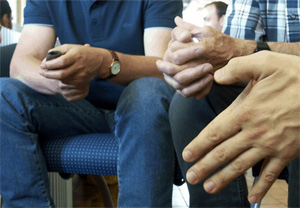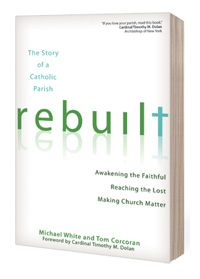
A Very Simple Solution
I am not saying that the parish model should be done away with, but in many cases our parishes have grown far too large for any real connections to happen, making it impossible to minister to people in a practical way. In the old days the priest knew his people on a first-name basis. These days he’s too busy celebrating the Mass multiples times a day (in our parish we have Mass every 2 hours on Sunday, that’s 8 Masses between only two priests). The good thing about this problem is that people are coming to church. The bad thing is that we are not providing a productive environment for spiritual growth. We are in the business of making disciples (Mt 28:19) but we aren’t doing a very good job considering our numbers.
Small groups are the solution to all the problems that plague the parish model. In a small group people know each other personally, even intimately due to openness and sharing. Relationships are formed in small groups. People hold each other accountable and fraternal correction is actually invited in a non-confrontational environment. People can minister to each other because they know each other. They are encouraged to go deeper into their relationship with God. They walk together in faith, living out the faith in practical ways. It’s really a perfect model to invite to, build up in, and walk in faith for any Christian.
In fact, the early Church was more closely related to small groups than to parishes, because they didn’t have big church buildings or public places where they could gather. They had to get together in the homes of fellow believers in hiding for fear of persecution.
Not Instead of, but in Addition to
Small groups can’t replace the parish, and they never should. They are meant to compliment the parish model by providing places for parishioners to get personal with their faith and truly live it out in community. The parish church is still the center of the faith community where all are welcome to come and receive the sacraments, but the small groups provide the environment for other important aspects of Catholic life.
For example, my wife and I are coordinators of the Family Catechism program at our parish. This program provides a family-oriented environment by actually getting the parents involved in the sacramental preparation of their children. Specifically, we invite the parents to come to weekly sessions where we meet in one of the homes of our community to pray, receive instruction, and reflect on the different teachings of the Catholic faith. Then they are sent home to their children with the responsibility to share the faith with them. This is a more natural way for the kids to grow in their faith, in the family—after all, the Church calls parents the “primary and principal educators” (Gravissimum Educationis, 3). We call these different groups “communities” that each consist of anywhere from 5-10 families—depending on the size of the home and the abilities of the catechist. We currently have 9 communities active in the Family Catechism program with around 70 families involved. It takes religion out of the classroom and into the home which is a more open environment for most people to express themselves openly.
As you see even religious education and sacramental preparation can adopt this format of small groups. It also works for youth and adults. It can be a formal or casual depending on the need. Each group can serve a specific purpose. There can be groups for men, for women, for singles, for newlyweds, for young families, for seniors, the possibilities are endless—whatever works best for your community.
How to Get Started with Small Groups
If you haven’t yet read Rebuilt: Awakening the Faithful, Reaching the Lost, and Making Church Matter, then you need to. It is the story of a Catholic parish in the midwest that realized that the old way of “doing church” wasn’t working anymore and they decided to do something about it. Among the changes they made in their parish were implementing small groups which they discuss in detail in Chapter 9: Build from Below.
Has your parish implemented small groups in any way?
If not, why not? If so, what has the result been?
